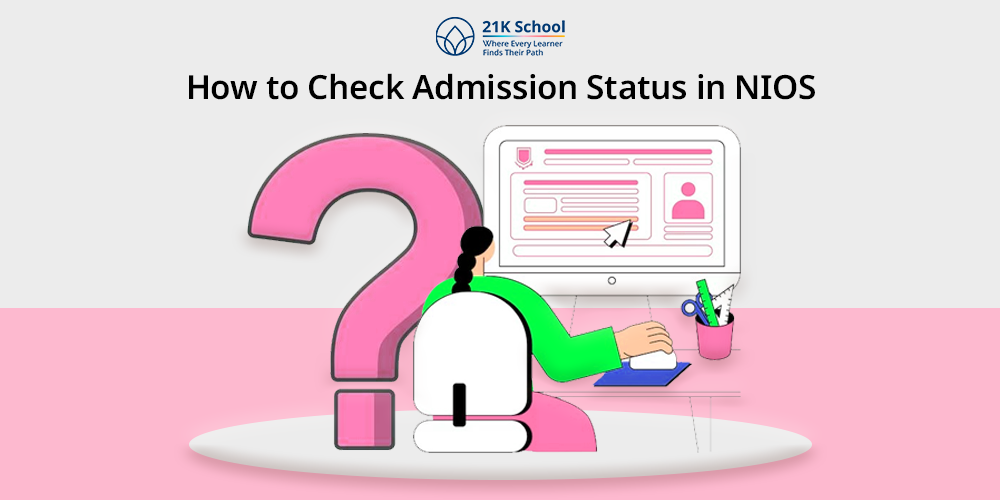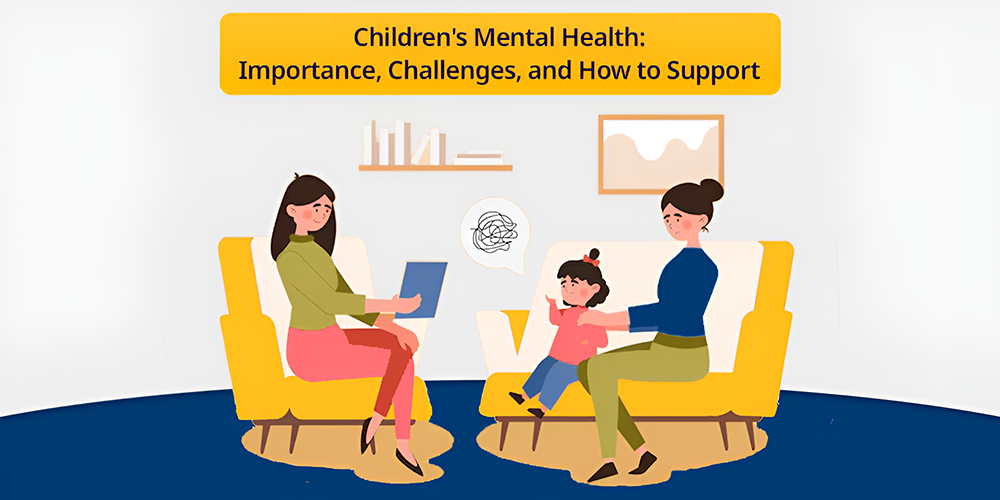
For the last decade we have been hearing a lot about mental health.
So is it just a concept for adults or is it also for children?
A child’s mental health is as important as an adult’s mental health and it is an essential part of their overall well being and development.
It takes in consideration all the things that a child feels, thinks or in a certain way that s/he behaves. It also includes their ability to handle stress, interact with others and make decisions in real life situations no matter how big or small the decision is.
Addressing a child’s mental health early in life is important because childhood forms a foundation for their life long emotional resilience and promotes cognitive abilities in them that helps them later grow into a more socially and emotionally stable person who can build relationships with others.
Ignoring a mental health issue at a small age can have a very far reaching consequence where it can impact academic performances, it can grow over relationships and decline the overall quality of life for the child.
Therefore it is very important to raise awareness regarding the issue and to provide all the necessary and required support into the system where the child grows encouraging healthy mental and emotional growth.
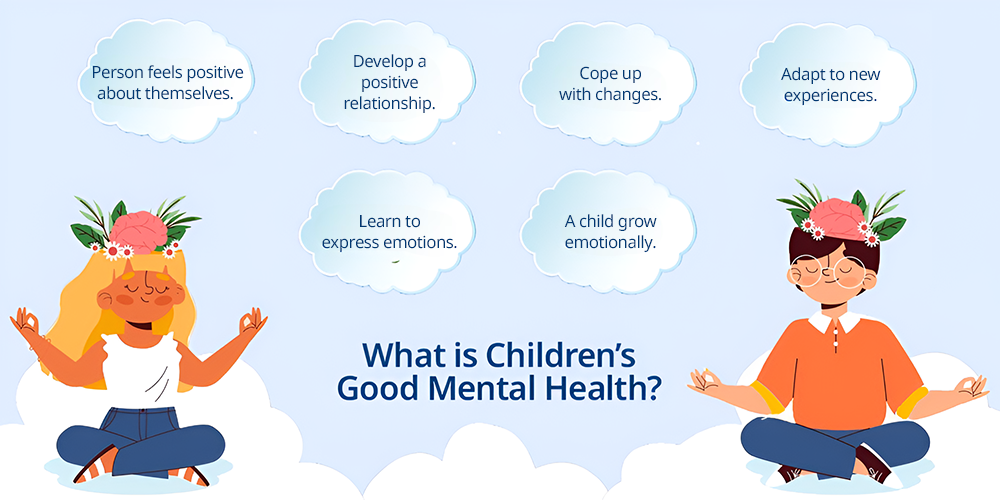
Contents
- What is Children’s Good Mental Health?
- Why is Good Mental Health Important in Children?
- Children’s Mental Health Issues in Schools
- Social Media and Children’s Mental Health
- Best Books for Children’s Mental Health
- 10 Factors Affecting Children’s Mental Health
- How to Avoid Problems Above Listed
- Prevention Strategies
- Key Stakeholders in Supporting Mental Health
- Conclusion
What is Children’s Good Mental Health?
It is often asked, what is good mental health?
A good mental health for everyone refers to the state of mind where a person feels positive about themselves.
Especially in the case of children, good mental health is referred to as a state of emotional psychological and social will that a child can develop in order to survive in an environment and positively reflect on it.
A child who is mentally and emotionally strong or healthy can :
- Develop a positive relationship in the society with everyone involved like pears, family, teachers and siblings.
- Healthy children can cope up with changes that take place and deal with challenges more effectively and handle daily stress very well.
- A child with good mental health can adapt to new experiences and learn from their setbacks rather than throwing tantrums and being rigid to the environment.
- They learn to express emotions constructively and regulate them very effectively to communicate with others and grow in any relationship they want.
- All these things make a student or a child grow emotionally and contribute to their holistic development making them more confident and boosting their self esteem.
A child with good mental health is likely to perform better academically and also will have strong relationships in society which helps them grow into a well adjusted adult who looks for positive opportunities and is more mentally stable.
Good mental health is not just about the absence of mental illness in one, but it also refers to the presence of emotional well being and the positive coping mechanism built in a child, that helps in laying the foundation for a better future.
Why is Good Mental Health Important in Children?
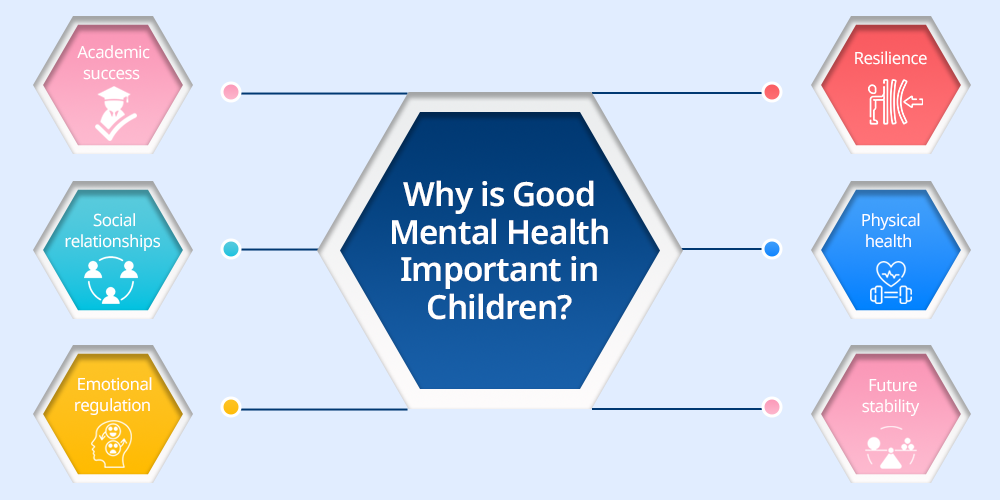
Good mental health is very critical for a child’s development. It contributes to their lifelong learning and the journey of life where every aspect is important whether it be academic, social or emotional.
Some of the reasons why good mental health is important in children are:
1. Academic success
A student who is mentally healthy is more likely to focus on school and grasp more information as compared to those who are struggling emotionally.
It contributes to their academic success and helps in knowledge retention making them perform well academically and achieve a stable mental health.
Good mental health helps children build positive relationships with peers, family, and teachers. It fosters empathy, teamwork, and effective communication skills.
2. Social relationships
In order to grow in society, mental well-being is very important as those who are mentally fit communicate effectively and make friends better.
Children specially build meaningful connections when they are more aware of their decisions and sound enough to make decisions and mark differences between the right and the wrong.
3. Emotional regulation
Children with healthy mental health develop skills better and know how to manage emotions and express them in the best form to be meaningful and to communicate.
The emotions can range from anger, fear and sadness to Joy, happiness and love.
4. Resilience
A mentally healthy child is better equipped with skills that are important to face problems and deal with challenges in any situation.
These skills even help in adapting to changes and maintaining their mental health later in difficult life events.
5. Physical health
A person who is mentally healthy will look after their physical health and for children who are sound mentally that mental state contributes to their overall physical health which will be reducing the risk of chronic illness or getting ill by stress or fear.
6. Future stability
A good mental health during the early stages of life translates into a strong emotional and mental health in adulthood contributing well to their overall development and future aspect of their life.
Early support for mental well-being can prevent long-term issues like anxiety, depression, and behavioral disorders. Encouraging open conversations about emotions helps children seek help when needed
Children’s Mental Health Issues in Schools
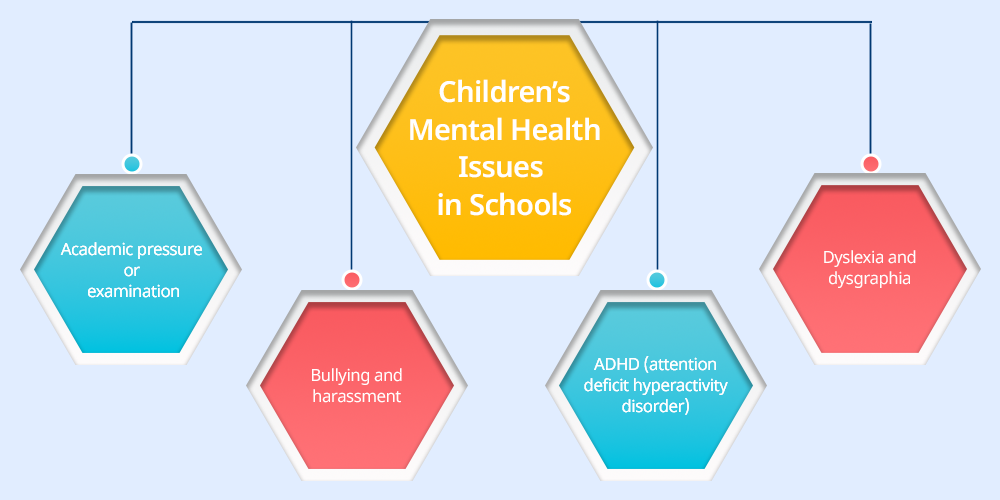
School plays a very important role in a child’s life as they are not only shaping their educational background but they also contribute to their emotional and mental health with time where academic pressure, examination and expectations from the society can create a lot of stress for children giving them problems like anxiety and stress disorder.
Now it is very important to understand that sometimes school can become a source of stress or even exacerbate mental health issues for them but they can also help in dealing with those challenges and giving them an environment which promotes emotional safety and supports mental health.
Some of the major mental health issues that a student can face in a school can be depression where they feel sadness, isolation or lack of connection with people around which can be easily catered with a healthy teachers-student relationship.
Students in school experience bullying and harassment as they try to fit themselves in the circle with their peers. Now this field attempt of trying to fit socially can negatively affect their mental will be and lead to mental disorders.
A condition like ADHD (attention deficit hyperactivity disorder) can make learning difficult and reduce the concentration of a student.
Which is the attention disorder of a result of unrest in the mind and un concentrated behaviour which is not in sync with the brain signals.
There are also some learning disabilities that a student faces during their academic journey like dyslexia and dysgraphia which often results in frustration and low self esteem making it a problem for students to survive and handle the academic pressure in the classroom environment.
All these issues can be catered with special education.
But the real question is is our education system really ready for a mental health education plan to be introduced — for the well being of students and teachers.
Social Media and Children’s Mental Health
The world is in the digital age and social media platforms are an avoidable part of everyone’s life. Students are introduced to the digital world at a very early age which impacts their creativity and connection building.
Certainly there are a lot of negative impacts that social media has on a child’s mental health which is a result of excessive use of social media.
Some of the negative impacts that social media has on a child mental health are:
- Comparison and low self esteem children often face problems and feelings of inadequacy as they compare themselves to others on social media which is not a sign of a healthy upbringing for a child.
It is suggested to teach children the value of the life they have and teach them new aspects that they can introduce positively into their life for the future. - Having an early online presence can lead to cyberbullying where children can face harassment and bullying online causing significant emotional damage and giving them trauma for their lifetime.
- All of these issues revolve around the problem of addiction where excessive screen time disrupts the students daily routine sleep cycle and their overall productivity hampering their skill development and creative understanding that constructively grows in the early stages of life.
- Another issue that children face due to the introduction of social media are anxiety, depression and feelings of isolation where exposure to unrealistic portrayals of beauty, standards, lifestyle and success makes children feel insecure of their achievement and lifestyle.
These issues lead to reduced FaceTime interaction and cause a sense of loneliness in children, keeping them isolated from society. Late-night scrolling and screen exposure interfere with healthy sleep patterns.
All these issues can be resolved and it is not to neglect that social media in some cases can also have positive impacts on a children’s life where if you constructively it can boost creativity and build an online community which can offer a platform for self expression to children and promote education.
In order to cater to all this problem parents educators and policy makers are suggested to work together to ensure a healthy use of the technology provided and not to exploit social media rather to use it in a healthy and constructive way.
Social media can be both beneficial and harmful for children’s mental health. With proper guidance, children can enjoy the positive aspects while minimizing risks. The key is balance, awareness, and open communication.
Best Books for Children’s Mental Health
One of the best tools to keep students engaged is reading which is a part of a journey that contributes to skills that are not easy to forget.
Books are very powerful tools to teach children about emotional resonance and mental health in a manner that they relate to and implement it in their real life.
Some of the books that can support children’s mental health are:
- “The Invisible String” by Patrice Karst: A heartwarming story that teaches children about love and connection.
- “The Color Monster” by Anna Llenas: A fun and creative book that helps children identify and understand emotions.
- “My Mixed Emotions” by DK and Elinor Greenwood: A book that explains different emotions and how to cope with them.
- “Listening to My Body” by Gabi Garcia: Encourages children to tune into their feelings and physical sensations.
- “What to Do When You Worry Too Much” by Dawn Huebner: A practical guide for kids dealing with anxiety.
- “The Feelings Book” by Todd Parr: A colorful and simple way to help kids recognize and express feelings.
With that being stated it is very crucial to know that books provide excellent information and act as a starting point for parents, teachers and care give us for children to introduce them to the concept of mental health and mental welding in a very child friendly way which is both constructive and helps in skill development.
10 Factors Affecting Children’s Mental Health
A child’s mental health can be influenced by various factors 10 major factors that influence a child’s mental health are:
1. Family environment
Stable and supportive family is essential for mental health, where a child that is raised in an environment with conflict and abuse is often phase neglected which can negatively impact the child’s mental health making them fragile to the situation and giving them disorders that sustain for lifetime.
2. Peer relationships
Having a healthy relationship with their friends and family can contribute to the emotional growth of a child.
While a toxic relationship or exclusion from society can lead to loneliness and anxiety giving child problems like detachment, commitment issues and in some cases even trust issues.
3. Academic pressure
Mental health is often triggered under stress and excessive focus on grades and performances creates stress for children giving them self doubt and making them less motivated towards their achievement creating a huge void in their life.
4. Socio economic status
Another concept which seems insignificant but highly contributes to a child’s mental health is poverty and financial stability again leads to stress making them feel insecure with the lack of resources they have and problems they face because of the lack of financial support and limited access to care.
5. Physical health
A child’s poor physical health or prolonged illness can impact the mental well being of a person and make them vulnerable to chronic illness.
It is often said that a person who is mentally fit can look after their physical health with the willpower and motivation.
6. Exposure to trauma
Experience is from a student’s early life which includes violence accident or a loss that can create a long term emotional scar on a child and leave them with issues that get triggered with similar instances or incidents leading to stress and disorders that look very much like post traumatic disorder.
7. Parental mental health
When parents are untreated with mental health conditions they tend to pass on their behavioural and emotional issues to that childrens as it is believed that children learn from what they see and slowly it affects their overall mental health and well being.
Technological advancement has many people over use and deploy technology to a level where it can disrupt social interaction and sleep cycle of a child creating a habit in them to feel addicted to it restricting their cognitive development and social development.
Society’s expectation towards a child in terms of gender restrictions behaviour or achievement often leach to stress and anxiety in them disrupting their sleep pattern and affecting their emotional regulation and cognitive functioning.
10. Access to mental health resources
Limited availability of counsellors and affordable mental health professionals can delay the diagnosis and the treatment process for a child making it a worst case.
How to Avoid Problems Above Listed
The above addressed issues require proactive prevention strategies for a child’s development as it can be heard through open conversation within families and schools facilitating healthy communication between them and creating a safe space for students to express their emotions.
It is also very important to provide children with tools of resonance and coping mechanisms which can help them handle challenges and deal with situations such as scars like , stress management, mindfulness, problem solving and analytical skills.
Now as we grow into a constructive world it is important to normalise discussions about mental health and feelings where it can encourage students to seek help whenever needed – this is to reduce the stigma and open opportunities for children and give space for inclusivity.
In certain cases the problem raised by social media and technology can also be balanced with regulation that can be made with the screen time as it can help in setting boundaries for the use of social media and promote offline activity and more participation in co-curricular activities in school and at home.
Mental health resources should be made more accessible to people and we should start promoting and advocating for schools and communities to provide a professional support system well integrated for children.
Prevention Strategies
1. Encouraging Healthy Communication Habits
When a student communicates it makes them healthy and makes them feel appreciated and involved.
Open conversations allow children to express their feelings freely in a classroom environment and also seek help when needed.
2. Building Resilience and Coping Mechanisms
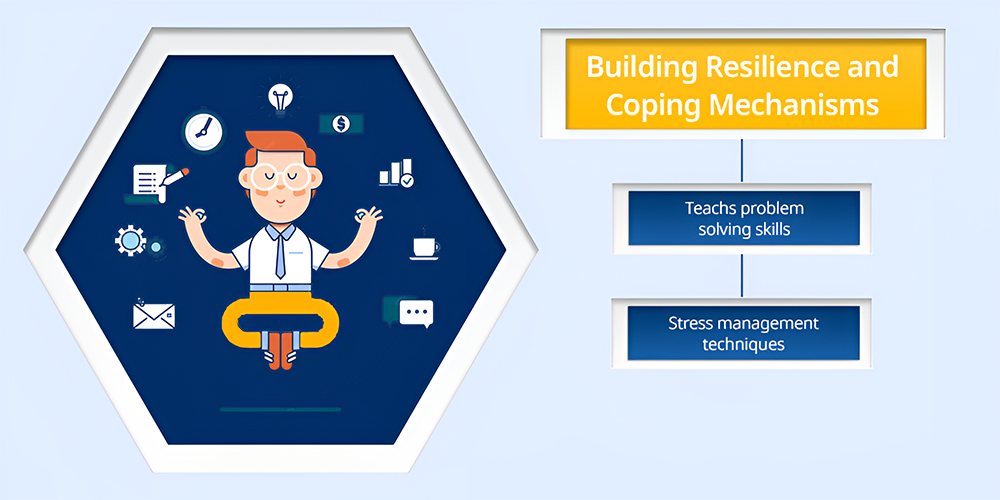
Children often learn skills as they interact with the world around them.
Teaching problem solving skills mindfulness and stress management techniques can help students in facing the challenges and problems more effectively. This will ultimately make them more confident.
3. Reducing Stigma Around Mental Health
When the world is talking about mental health it is high time to normalize discussions about the same and encourage students and children to seek help without fear of judgement and communicate their emotions to teachers and to parents.
Key Stakeholders in Supporting Mental Health
1. The Role of Parents and Caregivers
Parents and caregivers play a very important role in shaping a child’s mental health as from the initial days of their life the child is more dependent on their parents and only looks after them for support.
- Building Open Communication
For parents it is suggested to encourage children to talk about their feelings and make them comfortable in their own skin, motivating them to talk about everything.
The communication that they have with their child should make them feel that it is their safe space and they can talk about their feelings with their parents without fear of being judged or dismissed.
It is important to make them feel wanted and appreciated even with their flows and emotional shortcomings.
- Promoting a Supportive Home Environment
Parents have to create an environment which is safe for their children and nurture a space which makes them feel homely.
Children usually survive and develop better in situations and in environments where they feel valued and understood so it is the parents moral responsibility to create a supportive environment at their home.
- Recognizing Warning Signs
It’s not just the environment in the home but they should also be aware of the behaviour changes in their children and should notice every small or big change that might happen in their schedule then nature or behaviour.
The behaviour changes can be withdrawal irritability or declining academic performance which may indicate towards certain mental health concerns or problems that may lead to such concern.
2. Role of Schools in Supporting Mental Health
In the later days of their childhood, children spend most of the time in schools and schools foster mental health on a very wide level creating awareness regarding the same and also supporting students to cope up with such situations.
- Mental Health Education Programs
The school education system is very rigid and creates a lot of pressure on students.
Integrating a mental health education plan or program into the curriculum would help students in understanding their emotions and seeking support as and when required.
Students who grow up in a healthy situation or an environment tend to become a well equipped adult who can face problems and deal with issues more effectively.
- Availability of Counselors and Psychologists
Every school should have a counselor who can help students in assessing their mental health and can also help them in understanding the problems that they are facing with no biases or judgement.
- Role of Community and Professional Support
Community around students plays a very important role in supporting a children’s mental health. Where they often analyse the interaction and focus on mental health by identifying issues in everyday behaviour.
- Role of Community Programs
Community programs play a very interesting role in designing a child’s mental health as these programs provide a safe space for children to interact, learn and grow emotionally.
These centres often work after school and sometimes even as youth clubs offering creativity and social skills integrated in activities that promote mental well being.
This initiative reduces the stigma around mental health and encourages a support system.
- Access to Mental Health Services
There are multiple mental health services that are critical for identifying and diagnosing a mental health issue in children where a trained psychologist or a counselor can provide tools to students to manage stress anxiety and other emotional issues along with the support that families can provide to ensure a holistic approach for recovery.
- Importance of Early Intervention
It is very important to address mental health concerns at a very early stage before they escalate because detecting warning signs and the early stage can help children in getting timely support and can prevent long term sequences that can be caused because of the effects.
Conclusion

Children’s mental health is important from every perspective of life.
This helps students in developing emotionally, socially, academically and even on a cognitive level.
It is very important to understand the concept of mental health and intervene at the right time because with a supportive environment and access to resources the society can approach children’s mental well-being in a very transformative manner.
Everything around children in the early stage plays a very important role in shaping their mental health whether it be school families or community — they must help you to provide children the support they need.
By addressing key factors such as academic pressure, bullying, and social media usage, we can ensure that every child grows up resilient, confident, and emotionally healthy. Investing in children’s mental health today creates a stronger, healthier society for tomorrow.


